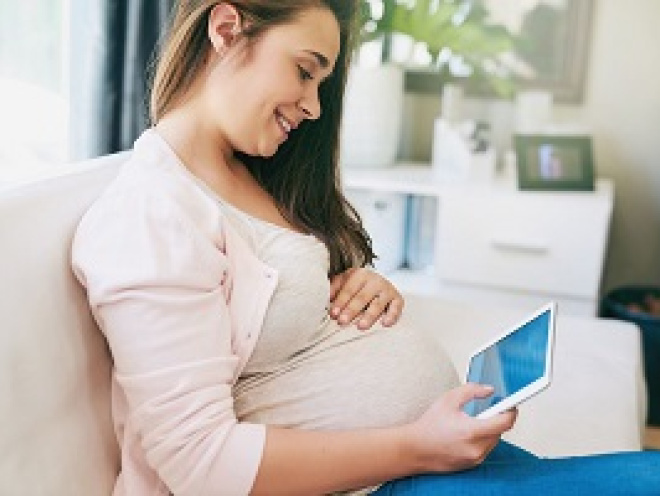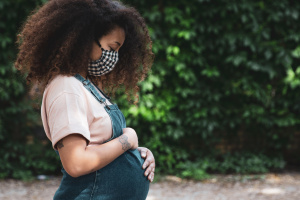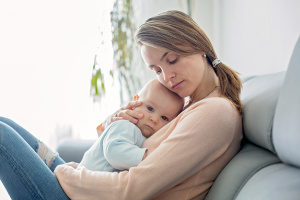If you're wondering how coronavirus might affect your labour and birth, here's what you need to know.
How might coronavirus affect your labour, birth plans and the arrival of your newborn baby? Read on to find out the facts.
You might find it useful to watch this NHS video about your care during your pregnancy and labour:
Do I need to change my birth plan because of coronavirus?
Hopefully it will reassure you to know that maternity units are working around the clock to manage additional pressures as a result of COVID-19 and support women to still have the birth they want (RCOG, 2020).
If you have no symptoms of coronavirus and have chosen to give birth at home or in a midwife-led unit that is not within an obstetric unit, it's important to say that these services rely on the availability of ambulance services to allow for rapid transfer to hospital, and the right number of staff to keep you safe. If these are not in place, it is possible that your Trust or Board may not be able to provide these services (RCOG, 2020). Talk to your maternity team to find out more.
A study by the UK Obstetric Surveillance System (UKOSS) provided some insights into how the coronavirus has affected pregnant women. The first report from this study looked at the outcomes of 427 pregnant women admitted to hospital with coronavirus and their babies during the pandemic. Read more here. The NHS website also has useful information on pregnancy and coronavirus.
What if I'm pregnant and have symptoms or I'm self-isolating?
If you think you may have coronavirus, or know you have it and you’re self-isolating, there will be different guidance and recommendations for your birth (see box below).
Your maternity team will discuss your choice of where to give birth with you if you have coronavirus symptoms and were planning to give birth at home or in a midwife-led unit. This is because an obstetric centre can provide continuous electronic monitoring for your baby if needed (RCOG, 2020a,b).
Advice for pregnant women with suspected or confirmed coronavirus
For up-to-date information about your pregnancy, labour and birth if you have coronavirus symptoms or you are self-isolating, please check the RCOG website. This has information jointly agreed by the Royal College of Midwives (RCM) and Royal College of Paediatrics and Child Health (RCPCH). They can help answer questions, such as:
- What should I do if I think I may have coronavirus or been exposed?
- How will I be tested for coronavirus?
- What should I do if I’m asked to self-isolate?
- Can I still attend my antenatal appointments if I am in self-isolation?
- How will my care be managed after I have recovered from coronavirus?
- What do I do if I feel unwell or I’m worried about my baby during self-isolation?
- Will being in self-isolation for suspected or confirmed coronavirus affect where I give birth?
- Will being in self-isolation for suspected or confirmed coronavirus affect how I give birth?
- What happens if I go into labour during my self-isolation period?
- Could I pass coronavirus to my baby?
- Will my baby be tested for coronavirus?
- Will I be able to stay with my baby/give skin-to-skin if I have suspected or confirmed coronavirus?
Will I be able to have my birth partner with me during labour and birth?
Yes, you should still be encouraged to have a birth partner with you during labour and birth (RCOG, 2020). We know what a huge difference having a trusted birth partner with you during labour can have.
If your birth partner has symptoms of coronavirus, they may not be allowed to go into the maternity suite with you though. This is to safeguard your health and the maternity staff supporting you (RCOG, 2020).
For peace of mind, you might consider having another back-up birth partner who can come with you if your planned birth partner can't.
BAME and pregnant?
The UKOSS study in May 2020 told us more about how coronavirus affects women and their babies during pregnancy and birth. It revealed a significant and worrying fact that 55% of pregnant women admitted to hospital with coronavirus were from a black, Asian or ethnic minority (BAME) background. Read more about support and information if you're pregnant and BAME here.
What about older children when I go into hospital for labour and birth, or a check-up during pregnancy?
Older children may not be able to go with you into the maternity unit, which means you will need to organise someone to care for them, such as a family member or friend. You'll have to discuss and arrange this with the chosen person in advance in order to make any necessary arrangements (RCOG, 2020).
You might want to avoid choosing someone in the vulnerable category, i.e. people over the age of 70, other pregnant women or individuals with significant medical problems (RCOG, 2020).
It's also a good idea to have a back-up plan - just in case the person you've asked has to self-isolate because they, or someone else in their home, are unwell with coronavirus when you need them (RCOG, 2020).
If I get coronavirus, will my baby catch it?
As we learn more, evidence suggests that passing on the virus from mother to baby during pregnancy or birth is possible but the chances are low(RCOG, 2020). It's important to know that in all reported cases of newborn babies developing coronavirus very soon after birth, almost all of the babies recovered rapidly and were able to go home with no lasting effects. Where this was not the case, other conditions were involved(PRU-MNHC, 2020).
Your maternity team will maintain strict infection control measures at the time of your birth and closely monitor your baby. After your baby is born, your maternity team will monitor them closely if you test positive for coronavirus (RCOG, 2020b).
Your baby would also have a test for coronavirus if you test positive (RCOG, 2020a). For more information, see the RCOG website.
Where do I get information about coronavirus and birth?
The expert guidelines and understanding about COVID-19 is changing on a daily basis. To make sure you have the most reliable information, refer to the guidelines on coronavirus and pregnancy published by the Royal College of Obstetricians and Gynaecologists, Royal College of Midwives and Royal College of Paediatrics and Child Health.
The guidance includes answers to a range of questions such as:
- Will I be able to have my birth partner with me if I am being induced?
- Will my birth partner be able to stay with me if I have a caesarean or assisted delivery that happens in an operating theatre?
- Will I be able to have my birth partner with me on the postnatal ward?
- Is there any advice for birth partners during the coronavirus pandemic?
It might feel like an uncertain, worrying time but your maternity team will still be there for you. Midwives and obstetricians are working hard to make sure all women feel supported through their labour.
Page last updated: December 2021
Further information
Interactive, engaging and social, our live online antenatal course is a great way for you to meet other local parents, and get essential unbiased information and knowledge about pregnancy, birth and early days with your baby.
Our support line offers practical and emotional support with feeding your baby and general enquiries for parents, members and volunteers: 0300 330 0700.
The NHS website has a specific pregnancy and coronavirus page, which has all the latest information and guidance about support services.
The RCM has produced this helpful FAQ with advice and information on different aspects of pregnancy and birth for women and their families.
For more information and updates about birth and the coronavirus, see the RCOG website.
Click on the following links for guidance on self-isolation and social distancing in Arabic, Bengali, Cantonese, French, Gujarati, Mandarin, Polish, Portuguese, Punjabi, Urdu and Welsh.
For more information about coronavirus in various languages see here.
RCOG. (2020a) Coronavirus infection and pregnancy. Available at: https://www.rcog.org.uk/en/guidelines-research-services/guidelines/coronavirus-pregnancy/covid-19-virus-infection-and-pregnancy/ (accessed 18th March 2020)
RCOG. (2020b) Coronavirus (COVID-19) infection in pregnancy. Available at: https://www.rcm.org.uk/media/3780/coronavirus-covid-19-virus-infection-in-pregnancy-2020-03-09.pdf (accessed 18th March 2020
PRU-MNHC (November 2020) New study Covid-19 and babies. Available at https://www.npeu.ox.ac.uk/pru-mnhc/news-and-blog/2033-new-study-covid-1… (accessed 26 November 2020)








